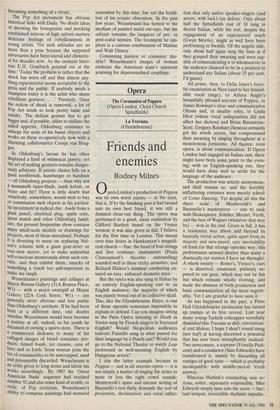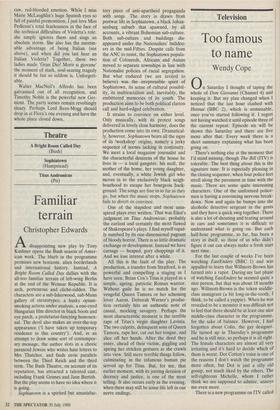Opera The Coronation of Poppea (Opera London, Christ Church Spitalfields)
La Traviata (Glyndebourne)
Friends and enemies
Rodney Manes
Opera London's production of Poppea was its own worst enemy — at the start, that is. If by the finishing post it had turned into its own best friend, it was still a damned close-run thing. The opera was performed in a good, clean realisation by Clifford Bartlett based on the Venice version; it was also given in full, I believe for the first time in London. This meant over four hours in Hawksmoor's magnifi- cent church — fine: the band of four strings and five continuo instruments (Paula Chateauneuf's theorbo outstanding) sounded well in these tricky acoustics, and Richard Hickox's minimal conducting en- sured an easy, unforced dramatic pace.
But the opera was also sung in Italian by an entirely English-speaking cast to an English audience, the majority of which was plainly bored out of its collective skull. This, like the Glyndebourne Katya, is one of those operatic nonsenses impossible to explain or defend. Can you imagine sitting in the Paris Opera listening to Death in Venice sung by French singers in fractured English? Would Neapolitan audiences tolerate Paisiello sung in what passed for their language by a Dutch cast? Would you go to the National Theatre to watch Lear performed in well-meaning English by Hungarian actors?
I cite the latter example because in Poppea — and in all seicento opera — it is not simply a matter of singing the notes to more or less the right vowel sounds: Monteverdi's spare and intense setting of Busenello's text flatly demands the sort of projection, declamation and vocal inflec- tion that only native speaker-singers (and actors, with luck) can deliver. Only about half the Spitalfields cast of 18 sang in decent Italian, while the rest, despite the engagement of an experienced coach (Gwyn Morris), might as well have been performing in Swahili. Of the angelic side, only about half again sang the lines as if they grasped their meaning and were cap- able of communicating it to whomsoever in the audience chanced to be in a position to understand any Italian (about 25 per cent, I'd guess).
All praise, then, to Della Jones's force- ful enunciation as Nero (and to her formid- able vocal range), to Arleen Auger's beautifully phrased account of Poppea, to James Bowman's clear and communicative Ottone and, in smaller roles, to Linda Hirst (whose vocal indisposition did not affect her diction) and Brian Bannatyne- Scott. Gregory Reinhart (Seneca) certainly got his words across, but compromised their meaning by singing throughout at a monotonous fortissimo. All theatre, even opera, is about communication. If Opera London had engaged an Italian cast, there might have been some point to the even- ing; with an English-speaking one, they would have done well to settle for the language of the audience.
The production was utterly anonymous, and shall remain so, and the horribly unflattering costumes were merely school of Come Dancing. Yet despite all this the sheer scale of Monteverdi's and Busenello's masterpiece — one to rank with Shakespeare, Schiller, Mozart, Verdi, and the best of Wagner (whatever that may be) — won in the end. Given in full, it has a resonance way above and beyond its basically trivial action, quite apart from its majesty and sure-paced, epic inevitability of form (in that strange operatic way, this performance seemed shorter than many a drastically cut version I have sat through). A whole society — Rome's, Venice's, ours — is dissected, examined, pitilessly ex- posed to our gaze, which may not be fun but which remains wholly riveting, and made the absence of both production and basic communication all the more regrett- able. Yet I am grateful to have seen it.
As has happened in the past, a Peter Hall Glyndebourne production has turned up trumps at its first revival. Last year many young-Turkish colleagues scornfully dismissed this Traviata as dull, convention- al and lifeless; I hope I shan't sound smug (not half) at having discerned a potential that has now been triumphantly realised. Two newcomers, a soprano (Fiorella Pedi- coni) and a conductor (Sian Edwards) have transformed it, mainly by discarding all vestiges of good taste — which is probably incompatible with middle-period Verdi anyway.
Whereas Haitink's conducting was se- rious, sober, supremely responsible, Miss Edwards simply lams into the score — fast, taut tempos, irresistible rhythmic impulse, raw, red-blooded emotion. While I miss Marie McLaughlin's huge Spanish eyes so full of painful premonition, I just love Miss Pediconi's total fearlessness in the face of the technical difficulties of Violetta's role: she simply ignores them and sings an absolute storm. She also has the inestim- able advantage of being Italian (see above), and when did you last hear an Italian Violetta? Together, these two ladies made 'Gran Dio! Morir si giovane' the moment of stark, soul-searing tragedy it should be but so seldom is. Unforgett- able.
Walter MacNeil's Alfredo has been galvanised out of all recognition, and Timothy Noble is the powerful new Ger- mont. The party scenes remain revoltingly sleazy. Perhaps Lord Rees-Mogg should drop in at Flora's one evening and have the whole place closed down.















































 Previous page
Previous page